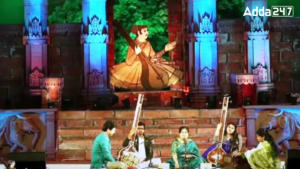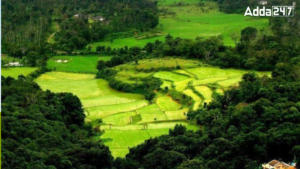43 UNESCO World Heritage Sites in India Till September 2024
As of September 2024, there are 43 UNESCO World Heritage Sites in India with the recent inclusion of “Moidams – the Mound-Burial System of the Ahom Dynasty from Assam. “The Sacred Ensembles of the Hoysala, the famed Hoysala temples of Belur, Halebid, and Somananthpura in Karnataka have been added to the United Nations Educational, Scientific and Cultural Organization (UNESCO) World Heritage list. This inclusion marks the 42nd UNESCO World Heritage Site in India and comes just a day after Rabindranath Tagore’s Santiniketan also received this distinguished recognition. The decision to include Santiniketan in the prestigious list was made during the 45th session of the World Heritage Committee, held in Saudi Arabia, reaffirming its importance on the global stage.
43 UNESCO World Heritage Sites in India
The UNESCO World Heritage Convention, which was established in 1972, recognizes and protects important cultural and natural sites around the world. India has recently added two more sites to the UNESCO World Heritage list, bringing the total number of Indian sites to 42. This makes India the sixth country in the world with the most UNESCO World Heritage Sites. Of the 43 Indian sites, 35 are cultural, 7 are natural, and 1 is mixed (both cultural and natural).
In other words, UNESCO has recognized 43 places in India as being of outstanding universal value, worthy of protection for future generations. These sites include ancient temples, forts, palaces, caves, national parks, and wildlife sanctuaries. India’s rich cultural and natural heritage is on display in these sites, which are a must-see for any visitor to the country.
| S.No | Name of Sites | Year | Location |
| 1 | Ajanta Caves | 1983 | Maharashtra |
| 2 | Ellora Caves | 1983 | Maharashtra |
| 3 | Agra Fort | 1983 | Agra |
| 4 | Taj Mahal | 1983 | Agra |
| 5 | Sun Temple | 1984 | Orissa |
| 6 | Mahabalipuram Monuments | 1984 | Tamil Nadu |
| 7 | Kaziranga National Park | 1985 | Assam |
| 8 | Keoladeo National Park |
1985 | Rajasthan |
| 9 | Manas Wildlife Sanctuary |
1985 | Assam |
| 10 | Churches and Convents of Goa |
1986 | Goa |
| 11 | Monuments of Khajuraho |
1986 | Madhya Pradesh |
| 12 | Monuments of Hampi |
1986 | Karnataka |
| 13 | Fatehpur Sikri | 1986 | Agra |
| 14 | Elephanta Caves | 1987 | Maharashtra |
| 15 | Great Living Chola Temples |
1987 | Tamil Nadu |
| 16 | Pattadakal Monuments |
1987 | Karnataka |
| 17 | Sundarbans National Park |
1987 | West Bengal |
| 18 | Nanda Devi & Valley of Flowers National Park |
1988 | Uttarakhand |
| 19 | Monuments of Buddha |
1989 | Sanchi, Madhya Pradesh |
| 20 | Humayun’s Tomb | 1993 | Delhi |
| 21 | Qutub Minar and its Monuments |
1993 | Delhi |
| 22 | Mountain Railways of Darjeeling, Kalka Shimla & Nilgiri |
1999 | Darjeeling |
| 23 | Mahabodhi Temple |
2002 | Bihar |
| 24 | Bhimbetka Rock Shelters | 2003 | Madhya Pradesh |
| 25 | Chhatrapati Shivaji Terminus |
2004 | Maharashtra |
| 26 | ChampanerPavagadh Archaeological Park |
2004 | Gujarat |
| 27 | Red Fort | 2007 | Delhi |
| 28 | Jantar Mantar | 2010 | Delhi |
| 29 | Western Ghats | 2012 | Karnataka, Kerala, Tamil Nadu, Maharashtra |
| 30 | Hill Forts | 2013 | Rajasthan |
| 31 | Rani Ki Vav (The Queen’s Stepwell) |
2014 | Gujarat |
| 32 | Great Himalayan National Park |
2014 | Himachal Pradesh |
| 33 | Nalanda | 2016 | Bihar |
| 34 | Khangchendzonga National Park |
2016 | Sikkim |
| 35 | Architectural Work of Le Corbusier (Capitol Complex) |
2016 | Chandigarh |
| 36 | The Historic City | 2017 | Ahmedabad |
| 37 | Victorian Gothic and Art Deco Ensembles |
2018 | Mumbai |
| 38 | The Pink City | 2019 | Jaipur |
| 39 | Kakatiya Rudreshwara (Ramappa) Temple |
2021 | Telangana |
| 40 | Dholavira | 2021 | Gujarat |
| 41 | Santiniketan | 2023 | West Bengal |
| 42 | Hoysala temples of Belur, Halebid and Somananthpura | 2023 | Karnataka |
| 43 | Modiams | 2024 | Assam |
What is UNESCO World Heritage Site?
UNESCO World Heritage Site is a place that is recognized by the United Nations Educational, Scientific and Cultural Organization (UNESCO). This is exemplified by the Convention regarding the Protection of the World Cultural and Natural Heritage, accepted by UNESCO in 1972.
Criteria for UNESCO World Heritage Sites:
1. Human creative genius.
2. Interchange of values.
3. Testimony to cultural tradition.
4. Significance in human history.
5. Traditional human settlement.
6. Heritage associated with events of universal significance.
7. Natural phenomena or beauty.
8. Major stages of Earth’s history.
9. Significant ecological and biological processes.
10. The significant natural habitat for biodiversity.
List of UNESCO World Heritage Sites in India:
Key points about UNESCO World Heritage Sites in India:
1. Ajanta Caves
- Famous for Buddhist Rock-cut Cave Monuments. It is richly decorated with Paintings and Frescoes like Sigiriya Paintings.
2. Ellora Caves
- Jain and Hindu Temples and Monasteries. These caves were excavated out of Hills, and it is a rock-cut Architecture.
3. Agra Fort
- This is one of the most prominent monumental structures by the Mughal empire.
4. Taj Mahal
- This is one of the Seven Wonders of the World. King Shahjahan had built this structure in the memory of his third wife Begum Mumtaz Mahal.
5. Sun Temple
- This temple is famous for the traditional style of Kalinga Architecture.
6. Mahabalipuram Monuments
- This monument is famous for the Mahabalipuram Largest. Open Air Rock Relief, Mandapas, Chariot Temples, It is a Pallava Dynasty Architecture.
7. Kaziranga National Park
- Famous for Worlds 2/3rd population of Great One-Horned Rhinoceroses. It has the highest density of Tigers in the World, Wild Water Buffalo, Elephants, Swamp Deer, and the park is also recognized as the Important Bird Area.
8. Keoladeo National Park
- This National Park is popular for Man-Made Wetland Bird Sanctuary, Hotspot for Ornithologists, and Siberian Cranes.
9. Manas Wildlife Sanctuary
- This sanctuary is famous for Project Tiger Reserve, Biosphere Reserve and Elephant Reserve
10. Churches and Convents of Goa
- It is famous for Rome of the Orient, First Manueline, Mannerist and Baroque Art Forms in Asia, First Latin Rite Mass in Asia.
11. Monuments of Khajuraho
- This monument is popular for a group of Jain and Hindu Temples. It is situated 175 km southeast of Jhansi. Well known for their Nagara style symbolism and erotic Figures and sculptures.
12. Monuments of Hampi
- Prosperous kingdom of Vijayanagar. The ruins at Hampi depict the fine Dravidian style of art and architecture. The most important heritage monument in this site is the Virupaksha Temple.
13. Fatehpur Sikri
- It structure constitutes of four main Monuments. The Jama Masjid, The Buland Darwaza,
Panch Mahal or Jada Baai ka Mahal, Diwane-Khas, and Diwan-eaam.
14. Elephanta Caves
- It is popular for Buddhist and Hindu caves. It is situated on Island in the Arabian Sea. And has Basal Rock Caves, and Shiva Temples.
15. Great Living Chola Temples
- This temple is popular for Chola Architecture, Sculpture, Painting, and Bronze Casting.
16. Pattadakal Monuments
- It is popular for its Chalukya style of architecture that originated in Aihole and blended with the Nagara and Dravidian styles of architecture.
17. Sundarbans National Park
- This National Park is popular as Biosphere Reserve, Largest Estuarine Mangrove Forest, Bengal Tiger, and Salt-Water Crocodile.
18. Nanda Devi & Valley of Flowers National Park
- It is famous for Snow Leopard, Asiatic Black Bear, Brown Bear, Blue Sheep, and Himalayan Monal, World Network of Biosphere
19. Monuments of Buddha
- It is popular for Monolithic Pillars, Palaces, Monasteries, Temples Mauryan Architecture, Ye Dharma Hetu Inscriptions.
20. Humayun’s Tomb
- It is popular for the Precursors to the Taj Mahal and Mughal Architecture. It constitutes a Tomb, a Pavilion, any Water Channels, and A Bath
21. Qutub Minar and its Monuments
- Includes Qutub Minar, Alai Darwaza, Alai Minar, Qubbat-ul-Islam Mosque, Tomb of Iltumish, and Iron Pillar.
22. Mountain Railways of Darjeeling, Kalka Shimla & Nilgiri
- The mountain railways of India comprise of the Darjeeling Himalayan Railway, the Nilgiri
Mountain Railway, and the Kalka-Shimla.
23. Mahabodhi Temple
- An important religious center for the Buddhists as this was the place where Mahatma Buddha attained enlightenment. Bodh Gaya is considered as the holiest pilgrimage spot for the Buddhists.
24. Bhimbetka
- It is famous for Rock Paintings within Natural Rock Shelters, Stone Age Inscriptions, Sitting Place of Bhima (Mahabharata).
25. Chhatrapati Shivaji Terminus
- It is popular for central Railways Headquarters, Terror Attacks on Mumbai in 2008, Gothic Style Architecture.
26. ChampanerPavagadhArchaeological Park
- This place is the only complete and unchanged Islamic pre-Mughal city. The park also houses some of the ancient Chalcolithic Indian Sites, from the Stone Age era.
27. Red Fort
- It is popular for Shahjahanabad, Persian, Timuri and Indian Architectural Styles, Red Sandstone Architecture, Moti Masjid.
28. Jantar Mantar
- Famous for Architectural Astronomical Instruments, Maharaja Jai Singh II, Largest of its kind Observatory.
29. The Western Ghats
- Famous for Among World’s Ten “Hottest Biodiversity Hotspots”. Includes many National Parks, Wildlife Sanctuaries, and Reserve Forests.
30. Hill Forts
- This place is famous for its unique Rajput Military Defense Architecture. It includes six majestic forts in Chittorgarh, Kumbhalgarh, Ranthambore Fort, Gagron Fort, Amber Fort, and Jaisalmer Fort.
31. Rani Ki Vav
- It is an explicit example of fine Ancient Indian architecture which is constructed during
the time of the Solanki dynasty.
32. Great Himalayan National Park
- It is home to about 375 fauna species and several floral species, including some very rare
species of plants and animals such as blue sheep, snow leopard, Himalayan brown
bear, Himalayan Tahr, musk deer spruces, horse chestnuts, and huge alpine meadows.
It is a part of the Himalayan Biodiversity Hotspots.
33. Nalanda
- A centre of learning and a Buddhist monastery from the 3rd century BCE to the 13th century CE.
34. Khangchendzonga National Park
- The national park is famous for its fauna and flora, with snow leopard being occasionally sighted.
35. Architectural Work of Le Corbusier (Capitol Complex)
- Recognized as a World Heritage Site as part of an outstanding contribution to the Modern Movement.
36. The Historic City
- A walled city on the banks of Sabarmati where communities following Hinduism, Islam, and Jainism have co-existed for centuries.
37. Victorian Gothic and Art Deco Ensembles
- It is a collection of 94 buildings of great cultural importance, located in the Fort Area of Mumbai.
38. The Pink City
- Jaipur is home to many magnificent forts, palaces, temples, and museums and also filled to the brim with local handicrafts and trinkets.
39. Kakatiya Rudreshwara (Ramappa) Temple
- The Ramappa Temple is situated in Palampet Village, Telangana. The temple is estimated to be at least 800 to 900 years old. The temple is especially known for lightweight porous bricks which are known as floating bricks
40. Dholavira
- Dholavira is an architectural site situated in the Kutch district of Gujarat. It is one of the most prominent Indus Valley Civilisation sites.
41. Santiniketan
- Santiniketan, the cultural and educational hub founded by Nobel laureate Rabindranath Tagore, has earned a coveted spot on UNESCO’s World Heritage List. This recognition marks a significant milestone for India and celebrates the enduring legacy of this unique institution located in Bengal’s Birbhum district.
42. Hoysala Temples
- The Sacred Ensembles of the Hoysala, the famed Hoysala temples of Belur, Halebid and Somananthpura in Karnataka have been added to the United Nations Educational, Scientific and Cultural Organization (UNESCO) World Heritage list. This inclusion marks the 42nd UNESCO World Heritage Site in India and comes just a day after Rabindranath Tagore’s Santiniketan also received this distinguished recognition.
43. Moidams
- In a significant cultural milestone for India, the “Moidams – the Mound-Burial System of the Ahom Dynasty” from Assam has been officially added to the UNESCO World Heritage List. Announced on 26th July 2024 during the 46th session of the World Heritage Committee in New Delhi, this recognition makes it the 43rd UNESCO World Heritage site from India.



 Which District of Madhya Pradesh is Famo...
Which District of Madhya Pradesh is Famo...
 Diwali 2024 Date and Significance: Is De...
Diwali 2024 Date and Significance: Is De...
 Which Indian City is Known as the Scotla...
Which Indian City is Known as the Scotla...

